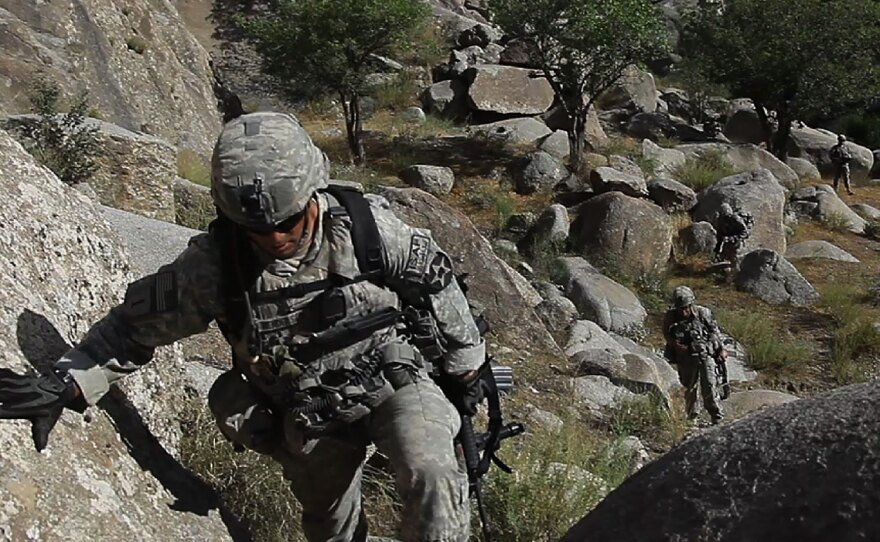When President Obama announced a new strategy for Afghanistan, he said an additional 30,000 U.S. troops would be deployed, in part, to take on Taliban militants on their home turf in the southern province of Kandahar.
Until a few weeks ago, U.S. and NATO military officials were describing the upcoming operation in Kandahar as a major offensive -- the cornerstone of the new strategy meant to break the momentum of the Taliban insurgency -- and said it was due to get under way this spring or in early summer, to be wrapped up by August.
But then last month, American military spokesmen in Kabul began telling reporters it was incorrect to use terms such as "offensive" or "operation" in describing plans for Kandahar. Last week, Gen. Stanley McChrystal, the top U.S. and NATO commander in Afghanistan, said the "efforts" in Kandahar are a process, not an event.
"We're not using the term 'operation' or 'major operations,' because that often brings to mind in people's psyche the idea of a D-Day and an H-hour and an attack," he said.
Lessons From Marja
Not only has the terminology changed, but so too has the timeline. Officials with the departments of State and Defense say an outright offensive won't be launched until this autumn at the earliest.
Instead, American soldiers will be training their Afghan counterparts in Kandahar, and targeting individual militants in the city and surrounding regions. The major offensive is on hold while the U.S. rethinks its strategy.
"I think what's happening in Kandahar is that they're digesting some of the lessons of Marja," says John Nagl, a counterinsurgency specialist with the Center for a New American Security.
In February, the U.S. launched an offensive in the villages of the Marja district, driving out the Taliban. Since then, militants have filtered back in, and the newly installed government is struggling to take hold.
Nagl says U.S. military strategists learned a great deal over the past few months with the Marja operation, and now they recognize the need for a strong government in Kandahar -- to help secure the trust of the city's residents -- before going in.
"We recognized that the Afghan government … didn't have much capacity to come into a new area and establish a high degree of control," Nagl says.
Building A Better Government
Nagl says the U.S. also went through a "rough patch" with Afghan President Hamid Karzai. U.S. officials recently launched a charm offensive to help smooth rocky relations with Karzai. He has now been given much more input into any military operations in Afghanistan, including operations in Kandahar.
Karzai told a Washington audience the first phase of the Kandahar process should include better resourcing, more intelligence and efforts to build a better government, "and then -- if and when and where needed -- an operation militarily, in consultation with the community and backed by the community. This is the approach that we have adopted."
Building better government in Kandahar will be difficult. Unlike in Marja, there is a government already in place in Kandahar, but it's weak and divided. Carl Forsberg with the Institute for the Study of War says the real power in Kandahar is held by warlords and power brokers such as Ahmed Wali Karzai, the president's half-brother, who heads the provincial council.
Forsberg says Ahmed Wali Karzai and his allies have control over some of Kandahar's police units -- and operate their own militias.
"It's a situation in which they're really able to exercise -- through the militias, through connections to the government in Kabul -- exercise a fair amount of influence over the formal institutions of the government," he says.
Forsberg says if the U.S. is to reform government in Kandahar, it has to take on the power brokers. But so far, he adds, little has been done.
"We're not sure what to do about governance in Kandahar," he says. "That just sort of led us to a situation where we're not doing particularly much."
The question is how long it will take the U.S., NATO and the Afghan government to stabilize Kandahar. Nagl says President Obama is expecting a progress report before the end of the year and the operation in Kandahar will be reviewed.
The U.S. is "going to have to see some results," he says.
Copyright 2022 NPR. To see more, visit https://www.npr.org. 9(MDAzMjM2NDYzMDEyMzc1Njk5NjAxNzY3OQ001))







